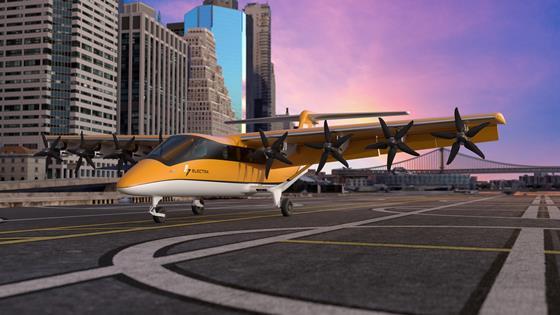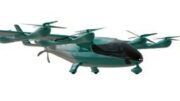US start-up developer Electra has selected electric propulsion units (EPUs) supplied by UK motor maker Evolito to equip the prototype of its EL9 hybrid-electric regional aircraft.
Electra announced the partnership on 13 October, saying Evolito’s motors will drive the in-development type’s eight wing-mounted propellers.
“Evolito will provide Electra with high-performance EPUs that integrate lightweight motors, high-integrity motor controllers and advanced thermal controls,” it adds.
While declining to disclose the power output to be provided by its EPUs, Evolito states: “We have been working with Electra for some time, developing requirements for their production aircraft.
“We are already shipping development content in 2025 and will be shipping the first flightworthy hardware to Electra in 2027,” it adds.
The certification target for the motor is “aligned with that of the EL9”, the UK company says, referring to a goal of achieving service-entry “in an end-of-decade landing zone”.
Electra chief executive Marc Allen says a distributed electric architecture makes the EL9’s blown-lift design feasible: its ultra-short take-off and landing performance stems from having its propellers push air over the wing surface to generate additional lift. In addition to the motors, the hybrid system will be composed of a battery pack and turbogenerators.
“Evolito’s lightweight, durable and cost-effective [motor] design will provide exceptional long-term value for operators through low maintenance, long life and proven reliability,” Allen adds.
Safran Helicopter Engines will supply the prototype aircraft’s turbogenerators, but Electra is considering bids from other companies to equip its ultimate production-conforming EL9.
Electra is still finalising the design of its EL9, which it says will cruise at 175kt (324km/h) and have 1,100nm (2,037km) of range. The aircraft will be able to take-off and land within about 46m (150ft), “unlocking thousands of new access points for air service”, it says.
The developer aims to fly the EL9 prototype for the first time in 2027 and to begin certification-credit flights in 2028 or 2029. It aims to complete the certification process with the US Federal Aviation Administration in 2029 or 2030.
Meanwhile, the private company expects to complete one more round of funding ahead of achieving the EL9’s operational introduction.
“We see private paths and we see other paths,” Allen tells FlightGlobal, adding: “We think there are unique advantages to being private during this development stage.”
The company – which secured $115 million in fresh funding earlier this year – has completed hundreds of flights with its smaller EL2 blown-lift demonstrator since 2023.
“We punch way above our weight,” he claims, noting that its accomplishments have been achieved with fewer employees than competing firms in the advanced air mobility sector.
The company has doubled its headcount this year to reach roughly 90 full-time employees. About 50% of this year’s new-hires are engineers, with others including supply chain staff and its first services and support workers. And Allen says it intends to hire “dozens more” engineers within the next year.
Electra also has expanded its facilities, opening a new 1,394sq m (15,000sq ft) hangar and adding office space at Manassas Regional airport in Virginia, about 30 miles (48km) west of Washington, DC. It also has added space to its research and development site in the Swiss city of Bleienbach, where it completed initial testing of the EL2’s hybrid-electric propulsion system.
“We have been advancing the state of the design,” Allen says of the EL9, with the company holding preliminary design reviews and planning to conduct a critical design review next year.
With a full-scale mock-up planned to be in its hangar within a few months, it has received some early components from suppliers, but is still working to finalise the aircraft’s “bill of materials”.
“We are putting together contracts with core suppliers,” says Allen. “The entire programme is now standing up on its feet.”
Electra has, meanwhile, recently completed a fresh phase of demonstration flights with its EL2.
“We used the summer to take the prototype and put her through her paces, both with some commercial customers and critical military stakeholders,” says Allen.
The EL2 took part in the US Air Force Research Laboratory’s Future Flag technology demonstration event, held in August and September in New York state. Allen says the activity helped the air force to “understand its usefulness to the war fighter” and how the technology could be integrated with operational units.
And in partnership with Surf Air Mobility – a US operator which holds rights to acquire EL9s – it also demonstrated the EL2 at Virginia Tech, landing the aircraft on a road, parking lot, field and a 300ft paved “drone pad”.
Source: Electra









Be the first to comment on "Electra’s hybrid-electric EL9 to soar with Evolito motors"